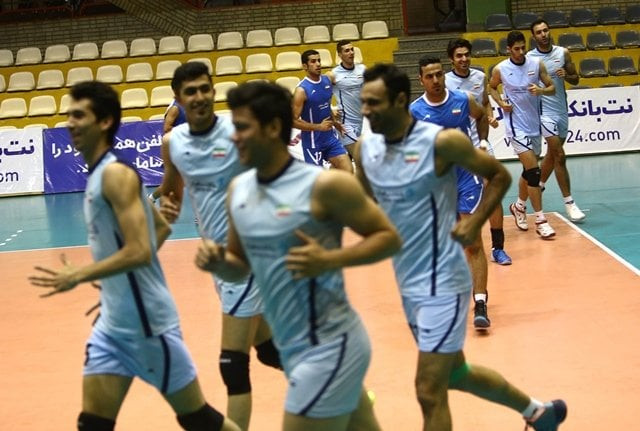Volleyball ban for women revives debate in Iran
Women's rights activists have taken to social media to voice frustration, posting the hashtag #letwomengotostadium

A file picture taken on July 8, 2014, shows Iran's volleyball national team players warming up during a training session at Azadi sports hall in Tehran. A ban on women attending Iran's male volleyball internationals against the United States has triggered a debate about their role in society, a sensitive topic in the Islamic republic. PHOTO: AFP
The Volleyball World League men's matches against the United States in Tehran on Friday and Sunday are generating huge excitement here, especially given the two countries' difficult relations after 35 years without diplomatic ties.
When the government announced this month that some women would be allowed at the matches despite a long ban on attending men's sporting events, many female fans were hopeful.
But local media reports have since said that only 200 of the 12,000 seats in the arena at Tehran's Azadi sport complex will be reserved for women.
This has sparked accusations that -- despite promises of increased openness -- Iranian authorities are still not willing to take on the country's hardliners.
Many women's rights activists have taken to social media to voice their frustration, posting on Twitter under the hashtag #letwomengotostadium.
"Really, what's wrong with women being in stadiums?" one asked, while another wrote: "So they just lied that they would let women in the #volleyball stadium? Is that how we work?"
Rules prohibiting women's access to stadiums have been in place since Iran's revolution of 1979, officially to protect them from obscene behaviour among male fans.
The government of President Hassan Rouhani, despite opposition from religious conservatives, has been trying to relax the restrictions. Recently, some women watched a male basketball match from a cordoned-off section of a venue in Tehran.
The issue of gender at sporting events garnered international attention after the arrest last summer of a British-Iranian law graduate, Ghoncheh Ghavami, who took part in a protest outside a stadium in the capital before a male volleyball match.
 An undated handout picture received on November 24, 2014 courtesy of the Ghavami family shows British-Iranian Ghoncheh Ghavami, who was controversially jailed in 2014 in Tehran after trying to attend a men's volleyball match. PHOTO: AFP
An undated handout picture received on November 24, 2014 courtesy of the Ghavami family shows British-Iranian Ghoncheh Ghavami, who was controversially jailed in 2014 in Tehran after trying to attend a men's volleyball match. PHOTO: AFPJailed for five months before being released on bail, she was later sentenced to a year in prison for propaganda against the regime and for having contacts with opposition groups. An appeals court eventually dropped other charges against her.
The case caught the attention of volleyball's governing authority, the FIVB, which last November banned Iran from hosting international championships because of the single sex rules on spectators. Football's FIFA was also critical and urged reform.
Iran's vice president for women's affairs, Shahindokht Molaverdi, this month expressed support for women being allowed to watch sports played by men, admitting to not knowing the reasons for restrictions.
In April last year, Rouhani admitted there were "deficiencies in women's rights and in gender equality," urging acknowledgement that "women stand alongside men and the two are equal."
But the government's moves toward reform have hit barriers, highlighting a split between conservatives anxious to preserve Islamic traditions and others in Iran who want greater openness.
Ayatollah Naser Makarem-Shirazi, an ultraconservative, recently questioned the "need in the current situation" to allow women to enter a stadium.
The president of the Iranian parliament's cultural affairs committee, Ahmad Salek Kashani, also criticised the move.
"Women who are allowed to enter the stadiums, what are they going to watch? Is it anything other than men's bodies that have been left bare because of sports clothes?"
A small protest against women in stadiums took place in Tehran on Wednesday, despite such demonstrations being deemed illegal.
The country's police chief, General Hossein Ashtari, has said his forces will act "under the law, even though some criticise us, because police are the guarantors of law enforcement," stressing that Iran is "a country where we must defend Islamic values."
His predecessor last year said diversity in stadiums "was not in the public interest".
The issue is expected to resurface during this summer's Asian Championship for volleyball in Tehran, organised by the Asian Federation and not by the FIVB. So far, stadiums are only expected to be open to women supporters from foreign countries during that tournament.



















COMMENTS
Comments are moderated and generally will be posted if they are on-topic and not abusive.
For more information, please see our Comments FAQ